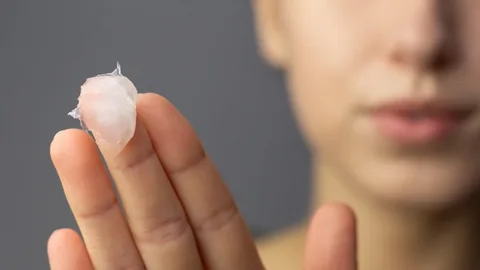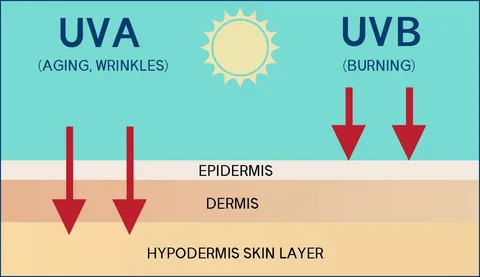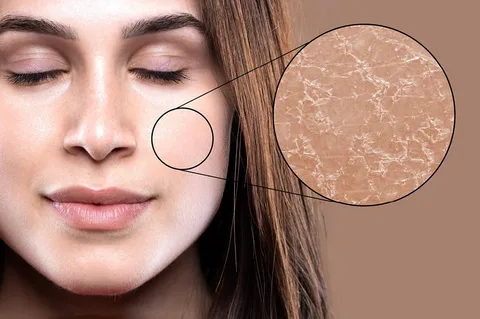In the world of skincare, there’s often confusion around the role sunscreen plays in achieving a lighter complexion. Many people wonder: Can sunscreen actually make your skin lighter or more radiant?
While sunscreen doesn’t lighten your skin in the traditional sense, it plays a significant role in maintaining a healthy and even skin tone, preventing sun damage, and promoting the appearance of brighter skin.
In this article, we’ll dive deep into how sunscreen works, the relationship between sunscreen and skin lightening, and why it’s an essential part of your skincare routine. Let’s get started!
Understanding Sunscreen: Its Role and Function
Sunscreen is often regarded as the first line of defense in protecting the skin from the harmful effects of the sun. But its benefits go beyond just preventing sunburn.
Sunscreen works by providing broad spectrum protection against UV rays, which are responsible for many of the skin’s negative reactions, including sunburn, premature aging, and hyperpigmentation.
The Two Types of UV Rays: UVA and UVB
To fully grasp how sunscreen helps maintain healthy, even toned skin, it’s important to understand the two types of ultraviolet rays:
- UVA rays: These rays penetrate deeper into the skin, causing premature aging (wrinkles, fine lines) and dark spots. They are responsible for skin damage even on cloudy days and throughout the year.
- UVB rays: These rays primarily affect the surface layer of the skin and are responsible for sunburns and skin cancer. UVB rays also contribute to melanin production, which leads to tanning and dark spots.
Sunscreen protects against both types of UV rays. The SPF (sun protection factor) rating of a sunscreen refers specifically to UVB protection, while PA rating measures the protection against UVA rays.
Choosing a broad spectrum sunscreen ensures that you’re fully protected from both.
How Sunscreen Prevents Skin Darkening
The direct question remains: Can sunscreen make your skin lighter? While sunscreen doesn’t directly lighten skin, it plays a pivotal role in preventing further skin darkening caused by UV exposure.
Here’s how sunscreen can help:
Preventing Hyperpigmentation
Hyperpigmentation occurs when your skin produces an excess of melanin, often triggered by sun exposure, acne scars, or inflammation.
When your skin is exposed to UV rays without protection, the skin reacts by producing more melanin, leading to dark spots or a tan. This process is often called post inflammatory hyperpigmentation (PIH), which can make your skin look uneven and darker.
By applying sunscreen daily, you block UV rays from triggering this overproduction of melanin. This helps keep existing dark spots from getting darker and prevents new spots from forming.
Essentially, sunscreen keeps your skin’s pigmentation in check, which can give the illusion of a lighter, more even skin tone.
Reducing the Risk of Darkening from Sun Exposure
One of the main causes of skin darkening is sun exposure. Many people find that their skin darkens after spending time outdoors without sunscreen.
If you’re prone to tanning or sunburns, sunscreen can act as a shield, preventing your skin from darkening and allowing your natural complexion to shine through.
Even if you don’t see an immediate change in your skin tone, regular sunscreen use will prevent future darkening and make your skin look fresher and brighter.
Preventing Photoaging
Photoaging is the process where prolonged sun exposure accelerates the formation of wrinkles, fine lines, and uneven pigmentation. Over time, sun damage can result in dry, dull, and uneven skin that can make your complexion appear darker or patchy.
Sunscreen is one of the most effective ways to combat photoaging, ensuring your skin remains youthful and radiant.
When your skin remains protected from the sun, it retains its natural moisture and smooth texture, which gives a more even, luminous appearance.
Without this protection, your skin may become duller and more uneven over time, contributing to the appearance of a darker tone.
Sunscreen and Skin Brightening: Not the Same as Lightening
A common misconception is that sunscreen can help you achieve a permanent lighter skin tone. While sunscreen can protect your skin and prevent further darkening, it does not alter your skin’s natural pigmentation.
However, sunscreen does play a role in brightening the skin’s appearance.
The Difference Between Brightening and Lightening
To avoid confusion, it’s important to clarify the difference between skin lightening and brightening:
- Skin lightening refers to the permanent reduction of melanin in the skin, resulting in a noticeable lightening of the complexion. This process often involves the use of chemical treatments or ingredients like hydroquinone.
- Skin brightening, on the other hand, refers to improving the overall appearance of the skin by making it look healthier, radiant, and more even toned. Sunscreen can help achieve brighter skin by preventing sunspots, dark patches, and uneven pigmentation caused by UV exposure.
Sunscreen’s primary job is to prevent the triggers for hyperpigmentation, giving your skin a glowing, even appearance.
It does not change the natural color of your skin but protects it from external factors that can cause it to appear darker.
Can Sunscreen Help Fade Existing Dark Spots?
If you’re already dealing with hyperpigmentation or dark spots, sunscreen won’t immediately fade these spots, but it plays a crucial role in allowing other treatments to work.
Treatments like vitamin C serums, retinoids, and alpha hydroxy acids (AHAs) work to fade dark spots and promote skin regeneration, but without sunscreen, these treatments may be ineffective.
Here’s why sunscreen is so important:
- Sunscreen prevents sun exposure from making dark spots darker. Without sunscreen, the sun can worsen existing hyperpigmentation, making it more difficult to lighten or fade spots.
- Sunscreen helps maintain the results of any brightening or skin tone evening treatments you’re using, allowing your skin to recover and regenerate more effectively.
In short, sunscreen doesn’t remove dark spots, but it’s an essential part of any skincare regimen aimed at reducing hyperpigmentation.
Ingredients to Look for in Sunscreen for Skin Brightening
While sunscreens aren’t designed to directly lighten your skin, many formulas contain additional ingredients that can brighten your complexion over time. These ingredients work alongside the sunscreen to create a radiant, glowing appearance.
Here are some common ingredients to look for:
Niacinamide (Vitamin B3)
Niacinamide is known for its skin brightening properties. It can reduce uneven pigmentation and dark spots, while also improving skin’s elasticity and texture. When combined with sunscreen, niacinamide provides an extra boost to your glowing complexion.
Vitamin C
Vitamin C is a powerful antioxidant that helps to neutralize free radicals caused by UV rays, preventing sun induced pigmentation. It also works to brighten and even out skin tone, making your skin look more luminous when used consistently.
Licorice Extract
Licorice extract is a natural ingredient that has been shown to help fade dark spots and brighten the skin. When formulated in sunscreens, it can contribute to an overall radiant complexion.
Alpha Arbutin
Alpha arbutin is a gentle skin brightening agent that works to reduce hyperpigmentation and dark spots. It is often included in sunscreens for its ability to promote a more even skin tone.
Myths About Sunscreen and Skin Lightening
There are several misconceptions surrounding sunscreen and skin lightening. Here are a few myths debunked:
Sunscreen Can Lighten Skin
While sunscreen helps to maintain your natural complexion, it does not lighten the skin in a permanent way. It prevents sun induced pigmentation but doesn’t alter the pigmentation of your skin.
Sunscreen Can Fade Dark Spots Immediately
Sunscreen does not fade dark spots instantly. It’s a preventative measure that protects against further pigmentation, allowing your skin to heal more effectively with time.
Sunscreen Causes Pale Skin
Sunscreen doesn’t make your skin pale; it simply protects it from sun damage that leads to darkening and pigmentation. Regular sunscreen use keeps your skin looking fresh and bright, not pale.
Conclusion
So, can sunscreen make your skin lighter? In a direct sense, no sunscreen does not lighten your skin. However, it plays a vital role in preventing sun damage, hyperpigmentation, and dark spots, all of which contribute to a brighter, more even complexion.
By protecting your skin from harmful UV rays, sunscreen helps preserve your natural skin tone and prevents it from darkening due to sun exposure.
If you’re looking to maintain a healthy, glowing complexion, sunscreen is an absolute must in your daily skincare routine. It keeps your skin protected, radiant, and youthful, while ensuring that any efforts to brighten or even out your skin tone aren’t undone by UV rays.
Combine sunscreen with other treatments for hyperpigmentation and uneven skin tone, and you’ll see visible improvements in your skin’s brightness and overall health.
FAQs
1. Can sunscreen make your skin lighter?
No, sunscreen doesn’t lighten your skin. It helps prevent further darkening and maintains a healthy skin tone by blocking harmful UV rays.
2. How does sunscreen help with hyperpigmentation?
Sunscreen prevents UV rays from causing additional pigmentation or darkening of existing dark spots, allowing your skin to heal and brighten naturally.
3. Does sunscreen brighten your skin?
While sunscreen doesn’t directly brighten your skin, it protects against sun damage that causes dark spots and uneven pigmentation, giving the illusion of brighter skin.
4. Can sunscreen fade dark spots?
Sunscreen doesn’t fade dark spots on its own, but it prevents them from getting darker, making it easier for other treatments to work.
5. What sunscreen ingredients help with brightening?
Ingredients like niacinamide, vitamin C, and licorice extract are known to help brighten and even out the skin tone when included in sunscreen formulations.
By now, it’s clear that while sunscreen isn’t a magic solution for lightening your skin, it’s crucial for preserving your natural complexion and protecting it from future sun damage.
Regular use of sunscreen will keep your skin looking fresh, healthy, and radiant, and ensure that you avoid darkening from sun exposure.




